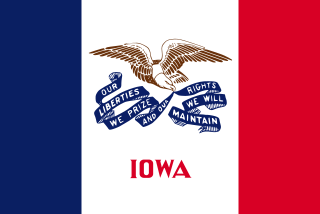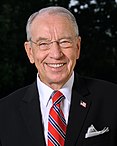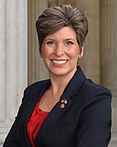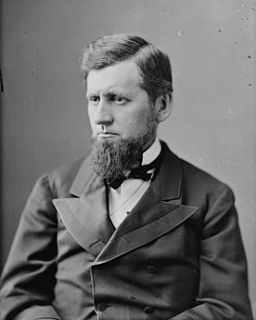Class 2 Class 2 U.S. Senators belong to the electoral cycle that were elected for two U.S. Congresses in the first elections of 1848, and then the seat was contested every three Congresses (six years) thereafter. The seat in recent years have been contested in 1996, 2002, 2008, and 2014. The next election will be in 2020. | C
o
n
g
r
e
s
s | Class 3 Class 3 U.S. Senators belong to the electoral cycle that were elected for one United States Congress in the first elections of 1848, and then the seat was contested every three Congresses (six years) thereafter. The seat in recent years have been contested in 1998, 2004, 2010 and 2016. The next election will be in 2022. |
|---|
| # | Senator | Party | Years in office | Electoral history | T
e
r
m | T
e
r
m | Electoral history | Years in office | Party | Senator | # |
|---|
| Vacant | December 28, 1846 –
December 7, 1848 | Legislature failed to elect due to a three-way split that prevented any candidate from earning the required number of 30 legislators' votes. | — | 29th | — | Legislature failed to elect due to a three-way split that prevented any candidate from earning the required number of 30 legislators' votes. | December 28, 1846 –
December 7, 1848 | Vacant |
| 30th |
| 1 | 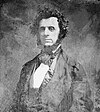
George W. Jones | Democratic | December 7, 1848 –
March 3, 1859 | Elected in 1848. | 1 | 1 | Elected in 1848. | December 7, 1848 –
February 22, 1855 | Democratic | 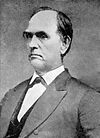
Augustus C. Dodge | 1 |
|---|
| 31st | 2 | Re-elected in 1849.
Resigned to become U.S. Minister to Spain, having lost re-election. |
| 32nd |
Re-elected in 1852.
Lost renomination. | 2 | 33rd |
| | February 22, 1855 –
March 3, 1855 | Vacant |
| 34th | 3 | Elected in 1855.
Elected invalidated, as the Iowa Senate had not participated in it. | March 4, 1855 –
January 5, 1857 | Free Soil | 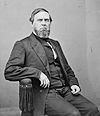
James Harlan | 2 |
|---|
| | January 5, 1857 –
January 29, 1857 | Vacant |
| Re-elected to finish his vacant term. | January 29, 1857 –
May 15, 1865 | Republican | 
James Harlan |
| 35th |
| 2 | 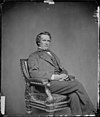
James W. Grimes | Republican | March 4, 1859 –
December 6, 1869 | Elected in 1858. | 3 | 36th |
|---|
| 37th | 4 | Re-elected in 1860.
Resigned to become U.S. Secretary of the Interior. |
| 38th |
Re-elected in 1864.
Resigned due to ill health. | 4 | 39th |
| | May 15, 1865 –
January 13, 1866 | Vacant |
Elected to finish Harlan's term. [2]
Lost nomination for the next term. | January 13, 1866 –
March 3, 1867 | Republican | 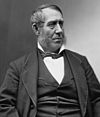
Samuel J. Kirkwood | 3 |
|---|
| 40th | 5 | Elected January 13, 1866. [3]
Lost re-election. | March 4, 1867 –
March 3, 1873 | Republican | 
James Harlan | 4 |
|---|
| 41st |
| Vacant | December 6, 1869 –
January 18, 1870 |
| 3 | 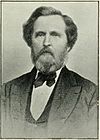
James B. Howell | Republican | January 18, 1870 –
March 3, 1871 | Elected to finish Grimes's term.
Retired. |
|---|
| 4 | 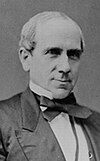
George G. Wright | Republican | March 4, 1871 –
March 3, 1877 | Elected in 1870.
Retired. | 5 | 42nd |
|---|
| 43rd | 6 | Elected January 17, 1872. | March 4, 1873 –
August 4, 1908 | Republican | 
William B. Allison | 5 |
|---|
| 44th |
| 5 | 
Samuel J. Kirkwood | Republican | March 4, 1877 –
March 7, 1881 | Elected in 1876 or 1877.
Resigned to become U.S. Secretary of the Interior. | 6 | 45th |
|---|
| 46th | 7 | Re-elected January 23, 1878. [5] |
| 47th |
| 6 | 
James W. McDill | Republican | March 8, 1881 –
March 3, 1883 | Appointed to continue Kirkwood's term.
Elected January 25, 1882 to finish Kirkwood's term. [6]
Retired. |
|---|
| 7 | 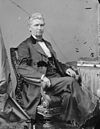
James F. Wilson | Republican | March 4, 1883 –
March 3, 1895 | Elected January 25, 1882. [7] | 7 | 48th |
|---|
| 49th | 8 | Re-elected January 23, 1884. [8] |
| 50th |
Re-elected in 1888.
Retired. | 8 | 51st |
| 52nd | 9 | Re-elected March 5, 1890. [9] |
| 53rd |
| 8 | 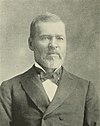
John H. Gear | Republican | March 4, 1895 –
July 14, 1900 | Elected January 17, 1894. [10]
Re-elected January 17, 1900, [11] but died. | 9 | 54th |
|---|
| 55th | 10 | Re-elected January 22, 1896. [12] |
| 56th |
| Vacant | July 14, 1900 –
August 22, 1900 |
| 9 | 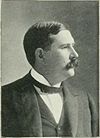
Jonathan P. Dolliver | Republican | August 22, 1900 –
October 15, 1910 | Appointed to finish Gear's term. |
|---|
Appointed to begin the vacant term.
Elected January 22, 1902 to finish the vacant term. [13] | 10 | 57th |
| 58th | 11 | Re-elected January 22, 1902. [14]
Renominated in 1908 but died before the general election. |
| 59th |
Re-elected January 23, 1907.
Died. | 11 | 60th |
| | August 4, 1908 –
November 24, 1908 | Vacant |
| Elected to finish Allison's term. | November 24, 1908 –
July 30, 1926 | Republican | 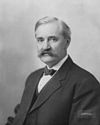
Albert B. Cummins | 6 |
|---|
| 61st | 12 | Re-elected January 19, 1909. |
| Vacant | October 15, 1910 –
November 12, 1910 |
| 10 | 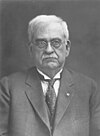
Lafayette Young | Republican | November 12, 1910 –
April 11, 1911 | Appointed to continue Dolliver's term.
Lost election to finish Dolliver's term. |
|---|
| 11 | 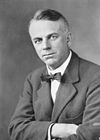
William S. Kenyon | Republican | April 12, 1911 –
February 24, 1922 | Elected to finish Dolliver's term. |
|---|
| 62nd |
| Re-elected January 21, 1913. | 12 | 63rd |
| 64th | 13 | Re-elected in 1914. |
| 65th |
Re-elected in 1918.
Resigned to become Judge of the U.S. Court of Appeals. | 13 | 66th |
| 67th | 14 | Re-elected in 1920.
Lost renomination, then died. |
| 12 | 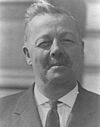
Charles A. Rawson | Republican | February 24, 1922 –
December 1, 1922 | Appointed to continue Kenyon's term.
Retired when his successor was elected. |
|---|
| 13 | 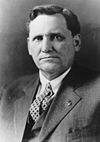
Smith W. Brookhart | Republican | December 1, 1922 –
April 12, 1926 | Elected to finish Kenyon's term. |
|---|
| 68th |
Re-elected in 1924.
Lost election challenge. | 14 | 69th |
| 14 | 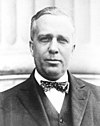
Daniel F. Steck | Democratic | April 12, 1926 –
March 3, 1931 | Successfully challenged his predecessor's election.
Lost re-election. |
|---|
| | July 30, 1926 –
August 7, 1926 | Vacant |
Appointed to continue Cummins's term.
Elected on November 10, 1926 to finish Cummins's term.
Retired. | August 7, 1926 –
March 3, 1927 | Republican | 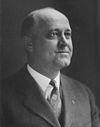
David W. Stewart | 7 |
|---|
| 70th | 15 | Elected in 1926.
Lost renomination and then lost re-election as an Independent. | March 4, 1927 –
March 3, 1933 | Republican | 
Smith W. Brookhart | 8 |
|---|
| 71st |
| 15 | 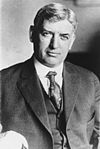
Lester J. Dickinson | Republican | March 4, 1931 –
January 3, 1937 | Elected in 1930.
Lost re-election. | 15 | 72nd |
|---|
| 73rd | 16 | Elected in 1932.
Died. | March 4, 1933 –
July 16, 1936 | Democratic | 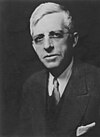
Richard L. Murphy | 9 |
|---|
| 74th |
| | July 16, 1936 –
November 3, 1936 | Vacant |
| Elected to finish Murphy's term. | November 3, 1936 –
January 3, 1945 | Democratic | 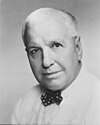
Guy Gillette | 10 |
|---|
| 16 | 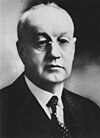
Clyde L. Herring | Democratic | January 3, 1937 –
January 3, 1943 | Elected in 1936.
Didn't take seat until January 15, 1937 as he wanted to remain Governor of Iowa. However, he was still elected and qualified as senator.
Lost re-election. | 16 | 75th |
|---|
| 76th | 17 | Re-elected in 1938.
Lost re-election. |
| 77th |
|
| 17 | 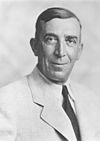
George A. Wilson | Republican | January 3, 1943 –
January 3, 1949 | Elected in 1942.
Didn't take seat until January 14, 1943 as he wanted to remain Governor of Iowa. However, he was still elected and qualified as senator.
Lost re-election. | 17 | 78th |
|---|
| 79th | 18 | Elected in 1944. | January 3, 1945 –
January 3, 1969 | Republican | 
Bourke B. Hickenlooper | 11 |
|---|
| 80th |
| 18 | 
Guy Gillette | Democratic | January 3, 1949 –
January 3, 1955 | Elected in 1948.
Lost re-election. | 18 | 81st |
|---|
| 82nd | 19 | Re-elected in 1950. |
| 83rd |
| 19 | 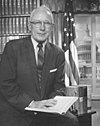
Thomas E. Martin | Republican | January 3, 1955 –
January 3, 1961 | Elected in 1954.
Retired. | 19 | 84th |
|---|
| 85th | 20 | Re-elected in 1956. |
| 86th |
| 20 | 
Jack Miller | Republican | January 3, 1961 –
January 3, 1973 | Elected in 1960. | 20 | 87th |
|---|
| 88th | 21 | Re-elected in 1962
Retired. |
| 89th |
Re-elected in 1966.
Lost re-election. | 21 | 90th |
| 91st | 22 | Elected in 1968.
Retired. | January 3, 1969 –
January 3, 1975 | Democratic | 
Harold Hughes | 12 |
|---|
| 92nd |
| 21 | 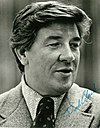
Dick Clark | Democratic | January 3, 1973 –
January 3, 1979 | Elected in 1972.
Lost re-election. | 22 | 93rd |
|---|
| 94th | 23 | Elected in 1974.
Lost re-election. | January 3, 1975 –
January 3, 1981 | Democratic | 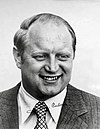
John Culver | 13 |
|---|
| 95th |
| 22 | 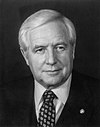
Roger Jepsen | Republican | January 3, 1979 –
January 3, 1985 | Elected in 1978.
Lost re-election. | 23 | 96th |
|---|
| 97th | 24 | Elected in 1980. | January 3, 1981 –
Present | Republican | 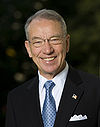
Chuck Grassley | 14 |
|---|
| 98th |
| 23 | 
Tom Harkin | Democratic | January 3, 1985 –
January 3, 2015 | Elected in 1984. | 24 | 99th |
|---|
| 100th | 25 | Re-elected in 1986. |
| 101st |
| Re-elected in 1990. | 25 | 102nd |
| 103rd | 26 | Re-elected in 1992. |
| 104th |
| Re-elected in 1996. | 26 | 105th |
| 106th | 27 | Re-elected in 1998. |
| 107th |
| Re-elected in 2002. | 27 | 108th |
| 109th | 28 | Re-elected in 2004. |
| 110th |
Re-elected in 2008
Retired. | 28 | 111th |
| 112th | 29 | Re-elected in 2010. |
| 113th |
| 24 | 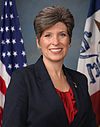
Joni Ernst | Republican | January 3, 2015 –
Present | Elected in 2014. | 29 | 114th |
|---|
| 115th | 39 | Re-elected in 2016. |
| 116th |
| To be decided in the 2020 election. | 30 | 117th |
| 118th | 31 | To be decided in the 2022 election. |
| # | Senator | Party | Years in office | Electoral history | T
e
r
m | | T
e
r
m | Electoral history | Years in office | Party | Senator | # |
|---|
| Class 2 | Class 3 |
|---|
